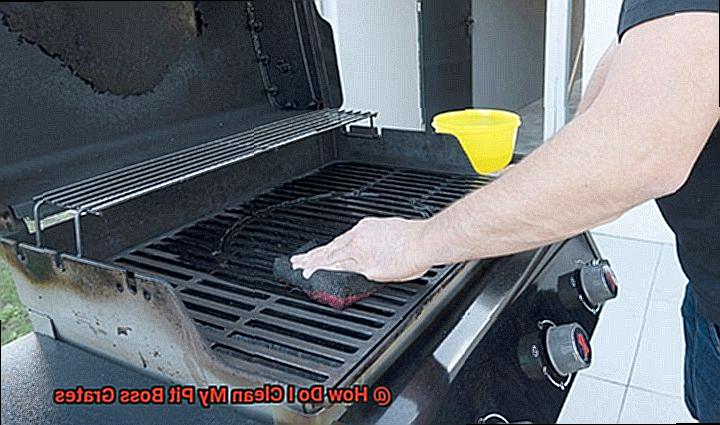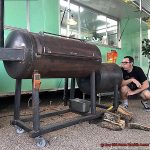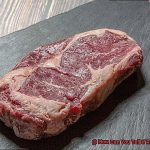Grilling on a Pit Boss BBQ is like a symphony for your taste buds. But let’s face it, after all that delicious food has been devoured, your grates are going to need some TLC. Sure, you can give them a quick brush and call it a day, but if you really want them to shine like new, there’s more to it than that.
That’s where we come in. In this article, we’re going to show you how to clean your Pit Boss grates like a pro. We’ll cover everything from the basic cleaning methods to tackling those pesky burnt-on bits that just won’t budge.
But wait, there’s more. We’ll also share some insider tips and tricks on how to maintain your grates so they stay in tip-top shape for years to come. Because let’s be real, nobody wants to spend all their time scrubbing grates when they could be enjoying some juicy steaks instead.
So, grab your apron and get ready to become a grill-cleaning master. It’s time to take your Pit Boss game up a notch.
Contents
Types of Pit Boss Grates
Grilling is a beloved pastime for many, but it’s important to keep your grill clean and well-maintained. Cleaning your Pit Boss grates is an essential part of this process, but it’s important to know what type of grate you have before you start scrubbing away. Here are the different types of Pit Boss grates and the best methods for cleaning them.
Porcelain-Coated Cast Iron Grates
Porcelain-coated cast iron grates are a popular choice among grillers because they offer excellent heat retention and distribution. However, they can be quite delicate and require special care when cleaning. To clean these grates, use a soft-bristled brush or sponge with warm soapy water to gently scrub away any food debris or grease. Avoid using abrasive cleaners or scrubbers that could scratch or damage the porcelain coating.
Stainless Steel Grates
Stainless steel grates are durable and easy to clean, making them a great choice for frequent grillers. To clean stainless steel grates, simply use a wire brush or grill scraper to remove any food debris or grease. You can also use a mild detergent and warm water to give your grates a deeper clean. However, be aware that stainless steel grates can be prone to sticking if not properly seasoned.
Cast Iron Grates
Cast iron grates are known for their durability and ability to retain heat, making them a favorite among serious grillers. However, cast iron grates require a bit more maintenance than other types of grates. To clean cast iron grates, use a wire brush or grill scraper to remove any food debris or grease. You can also use a mixture of equal parts water and vinegar to help break down any stubborn buildup on your grates. But be careful not to strip away the seasoning by using soap or harsh chemicals.
Expanded Metal Grates
Expanded metal grates are a budget-friendly option for Pit Boss grills. To clean these grates, use a wire brush or grill scraper to remove any food debris or grease. You can also soak them in warm soapy water to loosen any stubborn buildup. Just be sure to dry them thoroughly before using them again to prevent rusting.
Plated Steel Grates
Plated steel grates are another budget-friendly option, but they don’t provide as much heat retention as other types of grates. To clean these grates, use a wire brush or grill scraper to remove any food debris or grease. You can also use a mild detergent and warm water to give them a deeper clean.
In conclusion, knowing the type of Pit Boss grate you have is essential when it comes to cleaning and maintaining your grill.
Cleaning Porcelain-Coated Cast Iron Grates
Well, you’ve come to the right place. Cleaning these grates is essential to maintaining your grill’s longevity and performance, but it’s crucial to do it correctly. Here are some expert tips to help you clean your porcelain-coated cast iron grates like a pro.
Safety first. Before cleaning the grates, make sure your grill has cooled down completely. Once it has, remove the grates and place them on a flat surface.
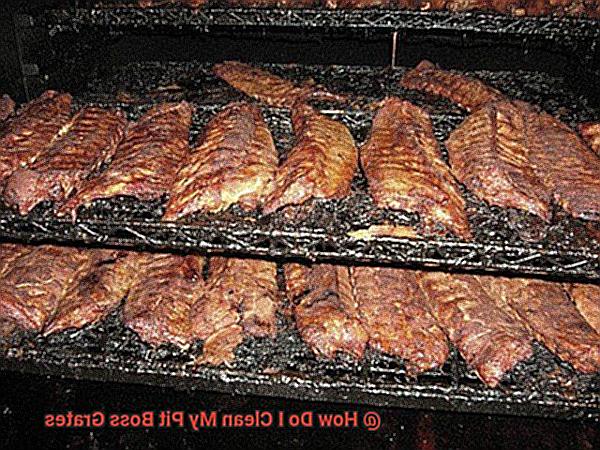
First things first, give the grates a good scrub with a soft-bristled brush or sponge to remove any leftover food residue or debris. It’s vital to be gentle with the porcelain coating as it can easily get damaged if not handled properly.
Next up, use warm, soapy water to clean the grates thoroughly. Be sure to use a mild dish soap that won’t harm the porcelain coating. Avoid using harsh chemicals or abrasive cleaners as they can scratch or damage the coating.
Rinse the grates thoroughly with clean water, making sure to remove all soap residue. It’s crucial to remove all soap residue to prevent any potential damage to the porcelain coating.
After cleaning, dry the grates completely with a clean cloth or towel. Remember, moisture can cause rust and corrosion, so make sure there isn’t any left on the grates.
Last but not least, apply a light coat of vegetable oil or cooking spray to the grates before putting them back in your grill. This will help prevent food from sticking and keep the porcelain coating protected.
To summarize, here are the steps for cleaning your porcelain-coated cast iron grates:
- Allow your grill to cool down completely.
- Remove the grates and place them on a flat surface.
- Use a soft-bristled brush or sponge to remove any remaining food residue or debris from the grates.
- Use warm, soapy water to clean the grates thoroughly.
- Rinse the grates thoroughly with clean water.
- Dry the grates completely with a clean cloth or towel.
- Apply a light coat of vegetable oil or cooking spray to the grates before reassembling them in your grill.
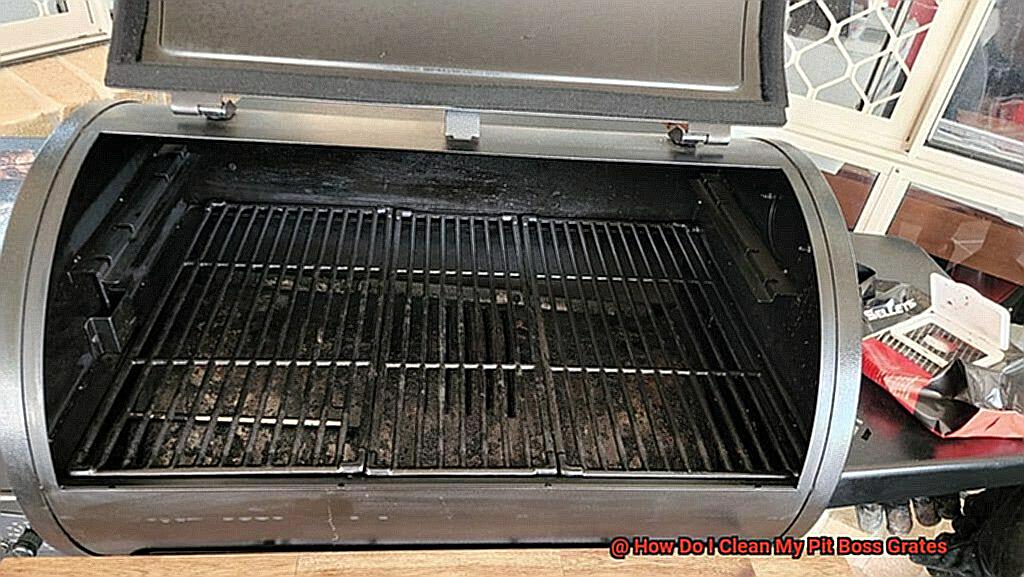
Cleaning Stainless Steel Grates
As much as we love firing up our Pit Boss grills and cooking up a storm, the aftermath of cleaning those stainless steel grates can be daunting. But fear not, with the right tools and techniques, you can have your grates looking brand new in no time.
Why is stainless steel such a popular choice for grill grates? Well, it’s durable, rust-resistant, and can withstand the high temperatures of grilling. However, even with these benefits, stainless steel grates can still accumulate stains and debris over time.
So, let’s get started on the cleaning process. The first step is to remove any excess debris or food particles. Use a grill brush or scraper while the grates are still warm to scrape off any leftover food or charred bits. This will make the next steps easier.
Now it’s time to break out the soap and water. Fill a bucket with warm water and add a mild dish soap or stainless steel cleaner. Dip a soft-bristled brush or sponge into the soapy water and scrub the grates in circular motions. Be thorough in cleaning both sides of the grates, as well as any corners or crevices.
After scrubbing, rinse the grates with clean water and wipe them dry with a clean towel or cloth. Make sure to dry them thoroughly to prevent any water spots or rust from forming.
For those stubborn stains or buildup on your stainless steel grates, don’t fret. There are a few extra steps you can take to get them looking spotless. One option is to make a paste out of baking soda and water and apply it to the grates. Let it sit for about 15 minutes before scrubbing it off with a brush or sponge.
Another option is to use a vinegar solution. Mix equal parts white vinegar and water in a spray bottle and spray it onto the grates. Let it sit for about 10 minutes before scrubbing away.
Rinsing and Drying the Grates
Before you put them away, don’t forget the crucial step of rinsing and drying them.
Rinsing the grates with water is essential to ensure that all the cleaning solution and remaining food particles are removed. You don’t want any leftover soap or debris to interfere with the flavor of your next grilled meal. So grab a hose or sink sprayer, and give those grates a thorough rinse. If you don’t have access to either, no worries. A clean damp cloth or paper towel will do the trick.
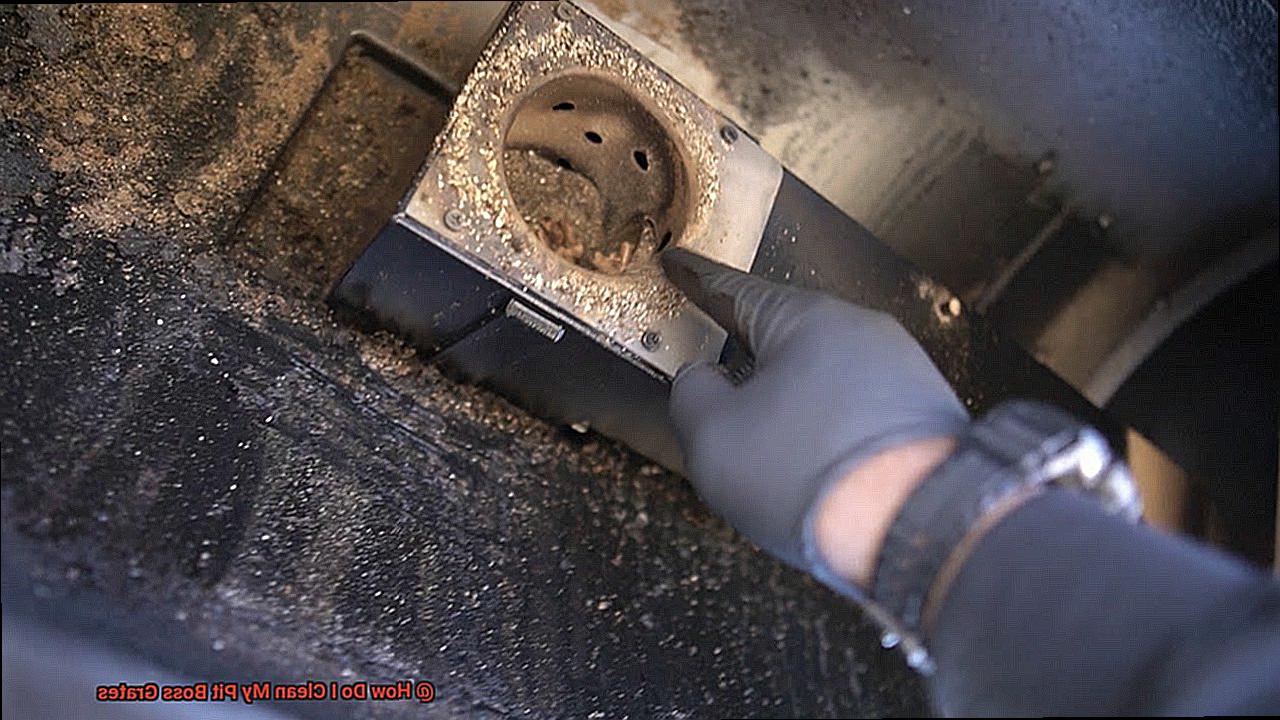
Once you’ve rinsed the grates, take a deep breath and pat yourself on the back. However, there’s still one more step left. Drying the grates completely is crucial in preventing rust and corrosion. Excess water left on the grates can lead to damage over time. You can air dry them by leaving them outside in the sun for a few hours, or you can dry them manually with a clean towel or cloth.
But if you’re looking to take things to the next level, consider seasoning your grates after cleaning and drying them. This process involves coating the grates with a thin layer of cooking oil and heating them up on the grill for about 15-20 minutes. Seasoning your grates helps prevent rust and makes it easier to cook food without sticking to the grates.
Applying Cooking Oil to the Grates
One of the most essential steps in caring for your grates is applying cooking oil. As an expert, let me guide you through this process, so you can achieve the perfect sear every time.
First things first, make sure your grates are clean and free of any debris. You don’t want any residue from previous meals spoiling your next feast. Once your grates are sparkling clean and dry, it’s time to apply the oil.
There are two ways to apply cooking oil to your grates. The first is to use a brush or paper towel to evenly coat the grates with high-heat cooking oil like vegetable, canola, or grapeseed oil. Apply the oil gently, as too much can cause flare-ups and smoking during cooking.
The second option is to use a cooking spray specifically designed for grilling. These sprays come in various flavors like butter or garlic, enhancing the taste of your food and making them convenient and easy to use. Just spray them directly onto the grates.
After applying the cooking oil, let it sit for a few minutes before heating up your grill. Doing this will give the oil enough time to penetrate the grates and create a protective layer against rust and corrosion.
It’s vital to remember that applying cooking oil to your pit boss grates regularly is essential, especially after cleaning them. This regular maintenance will help keep your grates in good condition and provide optimal performance for all your grilling needs.
Common Mistakes to Avoid When Cleaning Pit Boss Grates
To help you avoid some common mistakes, let’s dive into the dos and don’ts of cleaning Pit Boss grates.
First off, using harsh chemicals or wire brushes can do more harm than good. These cleaners can damage the grates and leave harmful residue that can transfer to your food. Instead, opt for a gentle cleaner or hot water and a soft-bristled brush.
Another pitfall to avoid is neglecting to clean your grates regularly. Grease and food build-up not only make cleaning more difficult but can also cause dangerous flare-ups during cooking. Make it a habit to clean your grates after every use.
While rinsing off soap or cleaning solution is important, using too much water can cause rust and corrosion on your grates. Be sure to dry your grates thoroughly after cleaning.
Last but not least, don’t forget to season your grates. This step helps protect your grates from rust and prevents food from sticking during cooking. After cleaning, apply a thin layer of oil to your grates before each use.
To recap, here’s what you should avoid when cleaning Pit Boss grates:
- Harsh chemicals or wire brushes
- Neglecting to clean regularly
- Using too much water
- Forgetting to season
Benefits of Regularly Cleaning Pit Boss Grates
Grilling is a favorite pastime for many, but it can quickly turn into a messy and potentially harmful activity if your pit boss grates aren’t cleaned regularly. As an expert in this area, I can confidently say that there are numerous benefits to keeping your grates clean and well-maintained.
Firstly, cleaning your grates ensures that your grilled food is safe to eat. Dirty grates can harbor harmful bacteria and germs, which can contaminate your food and cause serious health problems. By cleaning your grates regularly, you can enjoy healthier and safer grilled meals for you and your family.
In addition to improving food safety, regularly cleaning your pit boss grates also helps to prevent dangerous flare-ups during grilling. When grease and food particles accumulate on the grates, they become a fire hazard that can quickly ruin your food or worse, cause burns. By keeping your grates clean, you can reduce the risk of flare-ups and ensure that your food is cooked evenly.
Another benefit of cleaning your pit boss grates is that it helps to prolong their lifespan. Grease and food particles can cause corrosion and rust on the grates, leading to deterioration and the need for replacement. By regularly cleaning your grates, you can prevent this from happening and ensure that they last longer.
Lastly, keeping your pit boss grates clean helps to maintain their appearance and keep them looking new. A dirty and stained grate is not only unappetizing but can also be an eyesore in your backyard or patio. By taking care of your grates and keeping them clean, you can ensure that they look great and complement your outdoor space.
_kLnsuOyD9k” >
Conclusion
Grilling on a Pit Boss BBQ is an experience that no one wants to miss out on. However, cleaning the grates after use can be a daunting task. Fear not, as we have some tips and tricks for you to clean your Pit Boss grates like a pro.
Firstly, it’s crucial to identify the type of grate you have before cleaning it. Different types of grates require different cleaning methods. There are porcelain-coated cast iron, stainless steel, cast iron, expanded metal, and plated steel grates.
For porcelain-coated cast iron grates, use a soft-bristled brush or sponge with warm soapy water to gently scrub away any food debris or grease. For stainless steel grates, they are durable and easy to clean by using a wire brush or grill scraper to remove any food debris or grease.
After cleaning the grates, rinse and dry them thoroughly to prevent rust and corrosion. Applying cooking oil regularly is also essential in maintaining their optimal performance.
Regularly cleaning your pit boss grates has numerous benefits such as improving food safety, preventing dangerous flare-ups during grilling, prolonging their lifespan and maintaining their appearance.
In conclusion, follow these tips and tricks for cleaning your Pit Boss grates like a pro. You can enjoy delicious grilled meals while keeping your grill in tip-top shape for years to come.

